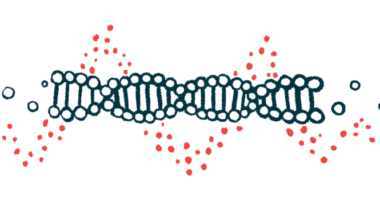New USP8 Gene Mutation Found in Pituitary Tumor of Cushing’s Patient

A newly discovered mutation in a gene called USP8 may contribute to the development of pituitary tumors, which are the underlying cause Cushing’s disease, researchers reported, describing the mutation.
Their work also linked tumors with mutations to more aggressive disease than those without mutations.
The study, “Genetic Profiling of a Cohort of Italian Patients with ACTH-Secreting Pituitary Tumors and Characterization of a Novel USP8 Gene Variant,” was published in the journal Cancers.
Cushing’s disease is caused by a tumor in the pituitary gland, a small structure in the brain. As a result of the tumor, the pituitary gland produces and releases excessive amounts of adrenocorticotropic hormone (ACTH), prompting the adrenal glands, located above the kidneys, to produce high amounts of the hormone cortisol. Excess cortisol levels are ultimately responsible for most Cushing’s symptoms.
Cancers arise because of genetic mutations that lead to uncontrolled cell growth. While some specific mutations are found in many types of cancer, the particular mutations that tend to drive malignant cell growth vary greatly tissue by tissue.
Because ACTH-producing pituitary tumors are rare and typically quite small — limiting the amount of tissue available for researchers to study — relatively little is known about the genetic drivers of the tumors causing Cushing’s disease.
A team of researchers in Italy performed genetic analyses on pituitary tumor samples collected during surgeries from 60 patients — 45 women and 15 men, with a mean age at diagnosis of 45 — between 1999 and 2020.
Scientists specifically looked for mutations in three genes — USP8, USP48, and BRAF — that have previously been linked to pituitary tumors.
Among the 60 patients, seven had mutations in USP8 and two had mutations in USP48. No mutations in BRAF were identified. Notably, a significantly greater proportion of patients with USP8 mutations experienced Cushing’s disease recurrence after having surgery compared with those without mutations (50% vs. 13%).
“In our cohort, mutated tumors seem to be associated with a more aggressive clinical phenotype [manifestation],” the researchers wrote, though they acknowledged that this analysis was limited by the relatively small number of patients with mutations.
Most of the mutations that investigators found have been previously associated with pituitary tumors. However, one USP8 mutation, known as the G664R variant, had never been reported before.
“The USP8 G664R variant was found in a 21-year old male with an ACTH-secreting microadenoma [a small pituitary tumor],” the researchers wrote.
Scientists then conducted a battery of tests to characterize this mutation. Computer modeling showed that the mutation likely led to the production of a dysfunctional protein. In experiments done in lab-grown cells, forcing the activation of the mutant gene caused pituitary cancer cells to divide more and to release higher amounts of ACTH.
The biological effect of the newly discovered mutation was overall similar to that of known cancer-associated mutations in USP8, leading the researchers to conclude that this mutation is also likely a cancer driver.







